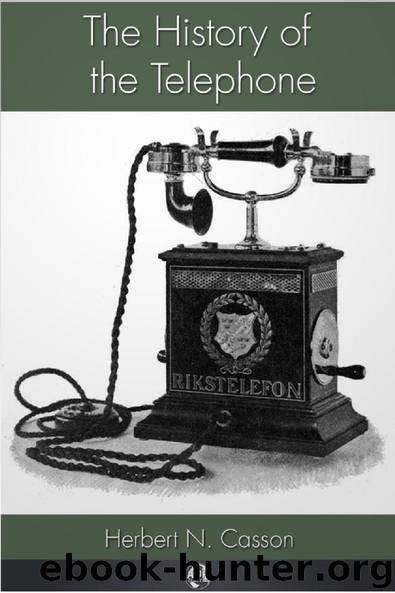The History of the Telephone by Herbert N. Casson

Author:Herbert N. Casson
Language: eng
Format: epub
Tags: reference, history, phone, alexander graham bell, technology, technological, communication
ISBN: 9781781666210
Publisher: Andrews UK Limited 2012
Published: 2012-06-14T00:00:00+00:00
CHAPTER V. THE EXPANSION OF THE BUSINESS
The telephone business did not really begin to grow big and overspread the earth until 1896, but the keynote of expansion was first sounded by Theodore Vail in the earliest days, when as yet the telephone was a babe in arms. In 1879 Vail said, in a letter written to one of his captains:
"Tell our agents that we have a proposition on foot to connect the different cities for the purpose of personal communication, and in other ways to organize a GRAND TELEPHONIC SYSTEM."
This was brave talk at that time, when there were not in the whole world as many telephones as there are to-day in Cincinnati. It was brave talk in those days of iron wire, peg switchboards, and noisy diaphragms. Most telephone men regarded it as nothing more than talk. They did not see any business future for the telephone except in short-distance service. But Vail was in earnest. His previous experience as the head of the railway mail service had lifted him up to a higher point of view. He knew the need of a national system of communication that would be quicker and more direct than either the telegraph or the post office.
"I saw that if the telephone could talk one mile to-day," he said, "it would be talking a hundred miles to-morrow." And he persisted, in spite of a considerable deal of ridicule, in maintaining that the telephone was destined to connect cities and nations as well as individuals.
Four months after he had prophesied the "grand telephonic system," he encouraged Charles J. Glidden, of world-tour fame, to build a telephone line between Boston and Lowell. This was the first inter-city line. It was well placed, as the owners of the Lowell mills lived in Boston, and it made a small profit from the start. This success cheered Vail on to a master-effort. He resolved to build a line from Boston to Providence, and was so stubbornly bent upon doing this that when the Bell Company refused to act, he picked up the risk and set off with it alone. He organized a company of well-known Rhode Islanders - nicknamed the "Governors' Company" - and built the line. It was a failure at first, and went by the name of "Vail's Folly." But Engineer Carty, by a happy thought, DOUBLED THE WIRE, and thus in a moment established two new factors in the telephone business - the Metallic Circuit and the Long Distance line.
At once the Bell Company came over to Vail's point of view, bought his new line, and launched out upon what seemed to be the foolhardy enterprise of stringing a double wire from Boston to New York. This was to be not only the longest of all telephone lines, strung on ten thousand poles; it was to be a line de luxe, built of glistening red copper, not iron. Its cost was to be seventy thousand dollars, which was an enormous sum in those hardscrabble days. There was much opposition to such extravagance, and much ridicule.
Download
This site does not store any files on its server. We only index and link to content provided by other sites. Please contact the content providers to delete copyright contents if any and email us, we'll remove relevant links or contents immediately.
Learning SQL by Alan Beaulieu(6281)
Weapons of Math Destruction by Cathy O'Neil(6265)
Digital Minimalism by Cal Newport;(5750)
iGen by Jean M. Twenge(5409)
Sapiens by Yuval Noah Harari(5366)
The Age of Surveillance Capitalism by Shoshana Zuboff(4277)
Elon Musk by Ashlee Vance(4121)
Thing Explainer by Randall Munroe(3930)
Apollo 8 by Jeffrey Kluger(3702)
Future Crimes by Marc Goodman(3592)
The Science Book (Big Ideas Simply Explained) by DK(3277)
The Innovators: How a Group of Hackers, Geniuses, and Geeks Created the Digital Revolution by Walter Isaacson(3158)
Who Can You Trust? by Rachel Botsman(3129)
I Live in the Future & Here's How It Works by Nick Bilton(2993)
Infinite Energy Technologies by Finley Eversole(2975)
Steve Jobs by Walter Isaacson(2889)
Dawn of the New Everything by Jaron Lanier(2770)
Chernobyl by Serhii Plokhy(2535)
Ben Franklin's Almanac by Candace Fleming(2523)
